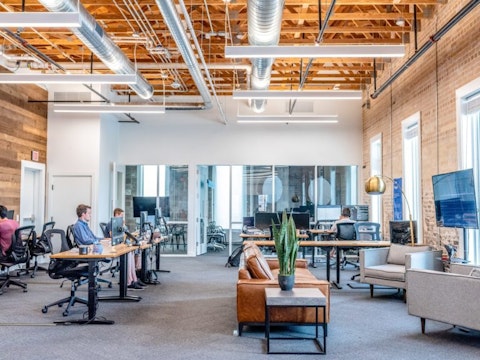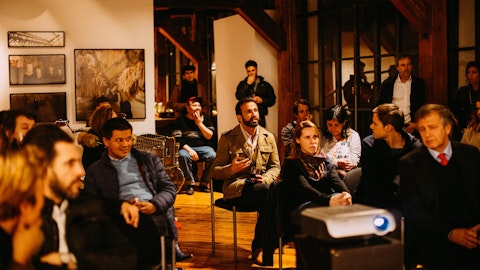Steelcase Inc. (NYSE:SCS) Q1 2024 Earnings Call Transcript June 22, 2023
Operator: Good morning. My name is Rob, and I will be your conference operator today. At this time, I would like to welcome everyone to the Steelcase First Quarter Fiscal 2024 Conference Call. All lines have been placed on mute to prevent any background noise. After the speakers’ remarks, there will be a question-and-answer session. [Operator Instructions] Thank you. Mr. O’Meara, you may begin your conference.
Mike O’Meara: Thank you, Rob. Good morning, everyone. Thank you for joining us for the recap of our first quarter fiscal 2024 financial results. Here with me today are Sara Armbruster, our President and Chief Executive Officer; and Dave Sylvester, our Senior Vice President and Chief Financial Officer. Our first quarter earnings release, which crossed the wires yesterday, is accessible on our website. This conference call is being webcast and this webcast is a copyrighted production of Steelcase Inc. A replay of this webcast will be posted to ir.steelcase.com later today. Our discussion today may include references to non-GAAP financial measures and forward-looking statements. Reconciliations to the most comparable GAAP measures and details regarding the risks associated with the use of forward-looking statements are included in our earnings release, and we are incorporating by reference into this conference call the text of our Safe Harbor statement included in the release.
Following our prepared remarks, we will respond to questions from investors and analysts. I will now turn the call over to our President and Chief Executive Officer, Sara Armbruster.
Sara Armbruster: Thanks, Mike. Hello, everyone, and thanks for joining the call today. Overall, we feel very good about our first quarter results, which were better than expected, as both revenue and adjusted EPS finished above the guidance range we provided in March. Our adjusted outlook — earnings outlook for Q2 is in line with the prior year and would put us ahead of pace to achieve our fiscal ’24 target. Dave will cover our results in more detail, but I’m proud of our sales teams for continuing to capture pricing benefits in response to the extraordinary inflation we’ve experienced over the past two years, and I want to thank our operations teams for the improvements they continue to drive. In addition, our win rate has continued to be very strong.
Amid our improved performance, the broader market in the Americas still faces uncertainty, and additionally, we’re seeing near-term challenges in international markets. We are taking actions to reduce our costs in the face of those challenges and we are seeing some positive signs that make us cautiously optimistic for the back half of the year. I want to thank those who joined us for our Investor Day in May or who’ve watched a replay of the webcast. We were excited to provide more details about all areas of our strategy and share our mid-term financial targets. I’d like to touch on a couple of those strategic focus areas next and link them into some highlights from last week’s annual NeoCon trade show in Chicago. Our goal is to lead the workplace transformation.
So, we were excited to integrate new products that support this vision into our NeoCon showrooms. One was Steelcase WorkValet, which offers innovation in workplace storage for mobile workers. And another was a range of seating offerings that balance a beautiful design aesthetic and high performance with new levels of sustainability. We also celebrated several NeoCon award wins for products that make hybrid collaboration easier and more effective, including the Ocular collection of conference and collaborative tables by Steelcase and several products from the HALCON OPTIC collection. We spoke with many of our larger customers during the week, and some of them described regretting that they put projects on hold during the last 18 months, and they now realize this has slowed their organization’s progress toward achieving business objectives.

Photo by Austin Distel on Unsplash
Many customers talked about the need for privacy in the workplace as well as the integration of technology within their conference rooms to provide better video conferencing experiences. And I consistently heard that they want these solutions in a way that supports their sustainability goals. The conversation really has moved beyond working from home and hybrid work, and it’s now about working better, as companies focus on updating outdated spaces to respond to their employees’ needs. To serve small- and medium-sized customers more completely, we showcased our Series 1 Task Chair with Air Back, which provides superior ergonomics at a great price point. We’ve also made significant advances in our Series 1 packaging, which reduces our carbon footprint and introduce a simplified assembly step, making it easy for those small and medium businesses to unpack their new product and put it together quickly.
Our health team showed applications for waiting rooms, infusion centers and clinician respite. These applications offer a softer hospitality look and feel while offering clinical performance and providing flexibility. Highlights included products from KwickScreen, a new Steelcase partner whose innovative, cleanable partitions create instant privacy for patients and staff. Another highlight was new enhancements to our West Elm Health Collection of soft seating. Designed by West Elm, this collection provides the comfort of home with added clinical features to improve the waiting room experience. Response from customers, architects and designers and dealers was outstanding, and we’ll continue to build on the energy of last week to fuel future innovation and shape the transformation of workplaces with our research and insights.
While NeoCon is a terrific opportunity to showcase our products and connect with customers, we haven’t let up on our efforts to improve our profitability. Our operations teams around the world are continuing to redesign our operational model to lower our cost structure. As we had previously announced, we expect to complete the closure of our Atlanta regional distribution center during the second quarter, as we continue to optimize our distribution system. We also drove additional savings this quarter by finding more opportunities to ship deliveries directly from our factories to the customer installation site as opposed to consolidating through our regional distribution centers. This allows for improved rate cost as well as reduce labor handling, and it supports our efforts to achieve our carbon reduction goals.
And these are just two examples of the many ways in which we’re continually rethinking how we operate. As we continue to orient our business for growth, we’re also excited to support the growth and advancements of more than 50 summer interns across 11 Steelcase locations. These interns represent 35 schools across the country and include women in STEM, students from Historically Black Colleges and Universities and International students. This diverse intern class exemplifies our commitment to creating career pathways for more people, which we believe ultimately delivers value for all our stakeholders. And Forbes Magazine agrees; they again ranked Steelcase among America’s Best Employers for New Grads based on an independent survey of more than 20,000 young professionals.
I’m excited about our start to fiscal ’24 and where we believe we’ll be at the end of the first half. We continue to navigate through an uncertain environment, but we expect to be ahead of pace against our financial targets halfway through the year. We remain committed to our strategy to lead the workplace transformation, diversify the customers and market segments we serve and improve our profitability. So, with that, I’ll turn it over to Dave to review the financial results and to share our Q2 outlook.
Dave Sylvester: Thank you, Sara, and good morning, everyone. My comments today will start with the highlights related to our first quarter results, balance sheet and cash flow. I will then share a few summary remarks about our outlook for the second quarter. As Sara said, overall, we feel pretty good about our first quarter results, as we continue to operate in an environment with macroeconomic uncertainty and geopolitical risks, and yet we delivered results that were better than the prior year and better than the expectations we communicated last quarter. Over the past several quarters we have taken a number of actions in response to the dynamic environment we faced, including taking unprecedented pricing actions in response to the extraordinary inflation we’ve incurred over the past two years, implementing cost reduction efforts and workforce reductions in reaction to volume declines and to support new strategic investments, and adjusting our supply chain to improve our operational agility and resiliency.
Both revenue and adjusted earnings in Q1 benefited from these actions, and, as a result, we exceeded the top ends of the ranges we provided in March. The better-than-expected revenue was driven by the Americas, which benefited from faster order fulfillment patterns, higher-than-expected incoming orders early in the quarter and favorable pricing benefits. Across our customer segments, revenue from our largest customers and government business was better than we expected, which was offset in part by a shortfall from our consumer retail segment. The revenue decline in International was primarily driven by a lower beginning backlog, but it was more significant than we estimated due to continued macroeconomic concerns, which contributed to our decision in the quarter to announce a series of restructuring actions in EMEA and Asia Pacific.
On a consolidated basis, revenue of $752 million was flat on an organic basis compared to the prior year, and included 2% growth in the Americas, offset by a 7% decline in International. Stronger revenue in the Americas drove our better-than-expected adjusted earnings, but we also had better operational efficiencies, which also contributed to higher gross margin compared to our estimates. The favorability in the Americas was partially offset by the impacts of the lower-than-expected volume in International. However, their gross margin also exceeded our expectations. Operating expenses were above our Q1 estimate, primarily due to the estimate including $10 million of anticipated gains related to the sale of our two aircraft, which was not completed in the quarter.
In addition, we recorded higher variable compensation expense due to our stronger-than-expected earnings. As it relates to cash flow and the balance sheet, we generated $11 million of cash from operating activities in the first quarter, as adjusted EBITDA of $52 million and a reduction in working capital of $35 million more than offset our seasonal disbursements related to variable compensation and retirement plan contributions. The working capital reduction is atypical for Q1 as we tend to increase inventories to support the seasonal strength of our second quarter. However, we continued to reduce safety stocks we built last year in response to the supply chain disruptions we experienced and inventory levels are also benefiting from some adjustments to our supply chain, which in total more than offset the seasonal build.
In addition, we saw an improvement in days sales outstanding, which drove a reduction in accounts receivable during the quarter. Our liquidity totaled $200 million at the end of the quarter. Total debt aggregated to $447 million, which was $35 million lower than Q4 as we paid off our maturing aircraft loan during Q1. At the end of the quarter, net debt was slightly higher than our trailing four quarter adjusted EBITDA, which totals $235 million and exceeds 7% of trailing four quarter revenue. Regarding orders in the quarter, we posted a year-over-year order decline of 7% in the first quarter, including declines of 6% in the Americas and 11% in International. These declines compared to strong growth in Q1 of the prior year, which reflected 22% growth compared to Q1 fiscal 2022.
On a sequential basis, orders in the first quarter grew 21% versus the fourth quarter of fiscal 2023, which is consistent with the seasonal increase we experienced in the prior year. In the Americas, the year-over-year decline approximated the level we expected, but the order patterns were a little stronger in March than they were in April and May, which contributed to our better-than-expected revenue in the quarter. Across quote types, the decline was driven by lower project business, partially offset by growth in our continuing business. In International, the order decline was more significant than we expected and was broad based across EMEA and in China, partially offset by double-digit growth across all other markets in Asia Pacific. In EMEA, we believe the economic environment may be experiencing a period of slowdown after a surprisingly resilient period over the last year, as many customers are referring to a pause in investment activity this calendar year.
At the same time, we are encouraged by 10% year-over-year growth in EMEA new project opportunity creation. And in Asia Pacific, our pre-sales activity levels have also been improving. Turning to our outlook for the second quarter, we expect to report revenue within a range of $815 million to $840 million, which would reflect a 3% to 6% decline year-over-year and we expect to report adjusted earnings per share of between $0.19 and $0.23, which compares to $0.21 in the prior year. In addition to the projected range of revenue, the adjusted earnings estimate includes: estimated gross margin of approximately 31.5%, which is approximately 250 basis points higher than the prior year and slightly better than the first quarter; operating expenses of between $225 million to $230 million, which is higher compared to the first quarter and includes seasonal sales commissions at Smith System and prioritized investments in marketing, product development and other initiatives, partially offset by $8 million of expected gains from the sale of fixed assets.
And lastly, we expect interest expense and other non-operating items to net to approximately $4 million of expense, and we’re projecting an effective tax rate of approximately 26%. Through the first half of the fiscal year, we are projecting to be ahead of pace on achieving the fiscal 2024 targets we have communicated in March. We remain focused on driving improved profitability and achieving our full year targets, while implementing our strategy and navigating an uncertain environment. From there, we’ll turn it back to the operator for questions.
See also 15 Best Beach Towns for Retirement and 20 American Cities with the Lowest Uninsured Rates.
Q&A Session
Follow Scansource Inc. (NASDAQ:SCSC)
Follow Scansource Inc. (NASDAQ:SCSC)
Receive real-time insider trading and news alerts
Operator: [Operator Instructions] And your first question comes from the line of Greg Burns from Sidoti. Your line is open.
Greg Burns: Good morning.
Dave Sylvester: Hey, Greg.
Greg Burns: Can you just talk — give us a little bit more color on the activity you’re seeing with your large corporate customers? What are you hearing from them? Are they starting to get a little bit more comfort with their outlook for their office needs? And do you expect the positive trend you saw this quarter to continue?
Sara Armbruster: Yes, Greg, this is Sara. So, I would say, if I reflect on some of the conversations last week at NeoCon as an example, I do think we were encouraged to see that many of the customers that we spoke to, as well as architects and designers were there with real projects and with meaningful plans to evolve offices. So, I felt like it was not a window shopping activity, it was people who were there with plans and activity kind of in mind. So it’s hard to generalize or project what will happen going forward, but I think we definitely felt that there was more focus, more intensity, and real plans behind those conversations as opposed to maybe hypothetical discussions about changes we might make to our space at some point in the future.
Greg Burns: Okay. And then in terms of your gross margin, have you full — are we fully offsetting inflation? Are you — have you completely closed the price/cost gap now, or is there some incremental gains to be still had there? And I know you announced about $50 million of targeted savings, cost of goods sold savings at your Analyst Day. So, considering all that, how should we think about the gross — your gross margin going forward if volumes don’t recover here?
Dave Sylvester: Well, you have a lot in there, let me try to unpack it. We’ll start with your question about pricing relative to inflation. As we said a quarter ago, our cumulative price yield from the price adjustments we had taken over the last two years finally caught up to the cumulative inflation. That’s on a just a dollar-for-dollar basis. So now what we’re targeting to capture is some gross margin on the hundreds of millions of dollars of inflation we’ve experienced over the last couple of years. So that’s why you’re seeing some of the year-over-year benefits in Q1 and why we’re projecting them again in Q2 with a gross margin estimate that’s 250 basis points higher than the prior year. That, in addition to the targeted improvements in gross margin that Bob Krestakos has talked about at our Investor Day, we expect will continue to drive gross margin improvement for us even if the volumes stay relatively flat or if they declined modestly.
But if they improve, then we should get even better benefits, which are baked into the mid-term targets that we communicated at the Investor Day in early May.
Greg Burns: Okay, great. Thank you.
Operator: And your next question comes from the line of Reuben Garner from Benchmark. Your line is open.
Reuben Garner: Thank you. Good morning, everybody.
Dave Sylvester: Hey, Reuben.
Sara Armbruster: Good morning.
Reuben Garner: Sara, maybe to follow-up on Greg’s question, I appreciate your conversations with NeoCon. I’m curious what you’re hearing more specifically about return to the office trends when you’re talking to the company leaders. We’ve heard a couple of examples of kind of either incentive-based pushes or mandates to get people back in the office. Any more color there that you can provide us in your conversations?





